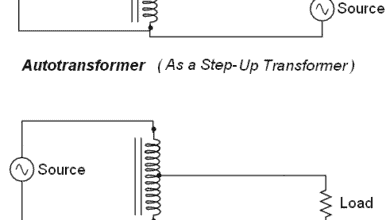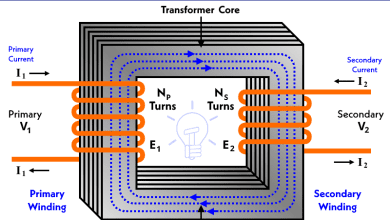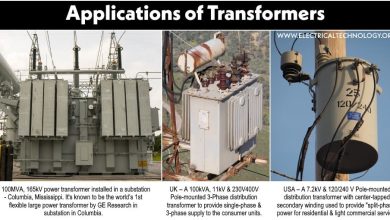Transformer
-
Transformer Library
Transformer Library Transformer Working principle of a transformer Ideal Transformer Induction law ( For Transformer) Ideal power equation of the Transformer E.M.F Equation of the Transformer Energy Losses in Transformer…
Read More » -
Transformers MCQs With Explanatory Answers
Transformers (MCQs With Explanatory Answers) 1. A Transformer is designed to be operated on both 50 & 60 Hz frequency.For the Same rating, which one will give more out put;…
Read More » -
What is an Ideal Transformer? Circuit, Working & Phasor Diagram
Ideal Transformer and Practical Transformer Ideal Transformer An ideal transformer is an imaginary transformer with zero ohmic, magnetic leakage, copper and core losses. In other words, an ideal transformer is…
Read More » -
What is the Difference Between Power Transformers and Distribution Transformers?
Main Difference between Power Transformer and Distribution Transformer The working principle of all transformers is the same i.e. electromagnetic induction whereas design, function, purpose of applications and winding configurations differentiate…
Read More » -
Transformer Nameplate Data – Explain the Rating and Features
General Requirements of a Transformer Nameplate to Show the Characteristics Following are the minimum information and data printed on a transformer nameplate from the designer and manufactures. The standards require…
Read More » -
Applications of Transformers
Uses and Applications of Transformers The operating principle of all kinds of transformers designed for different applications are the same e.g. electromagnetic induction whereas the applications of transformers are different…
Read More » -
Advantages of a Three Phase Transformer over a Single Phase Transformer
Advantages and Disadvantages of a 3-Φ Transformer Over a 1-Φ Transformer Advantages of Three Phase Transformer over a Single Phase Transformer Following are the advantages of a 3-Φ transformer…
Read More » -
Transformer Losses – Different Types of Losses in a Transformer
Types of Energy Losses in an Electrical Transformer An ideal transformer is characterized by zero energy losses, making it 100% efficient. However, practical transformers in real-life applications experience energy dissipation in…
Read More »







